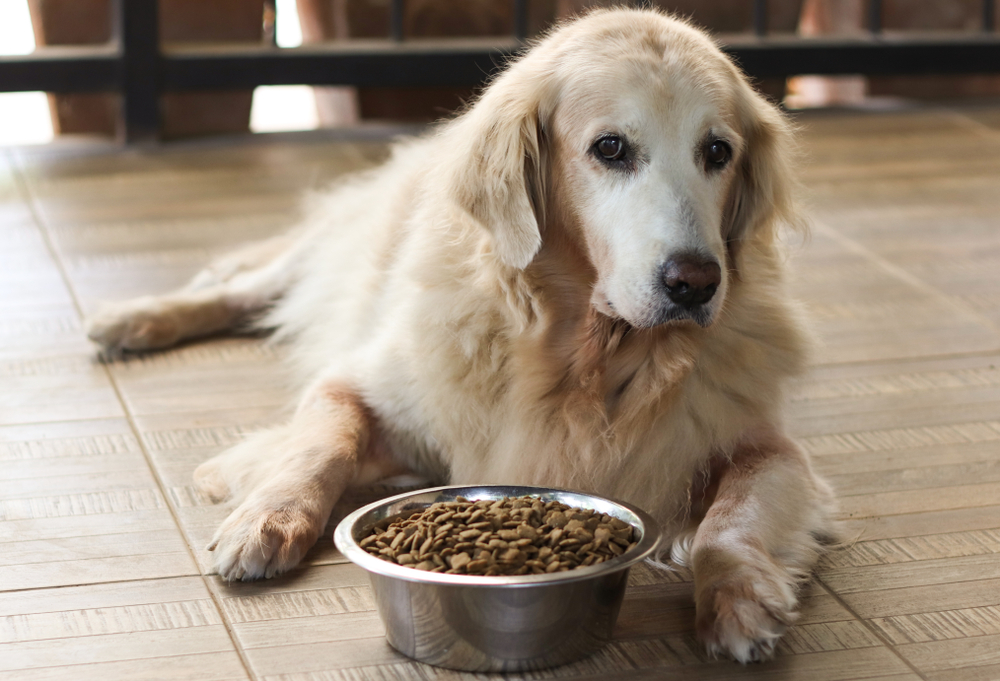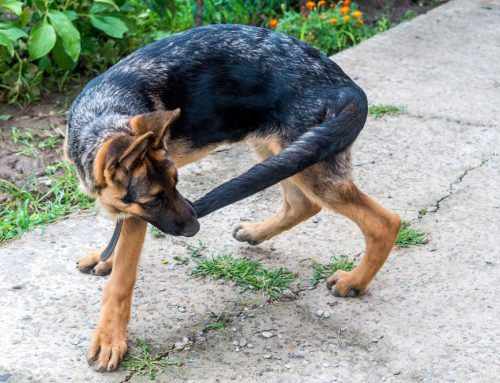You are likely familiar with the awful retching noise and the pained facial expression your dog makes right before they vomit—usually on your most expensive rug. Dogs commonly vomit, which can be a nonspecific sign of many different underlying conditions. The cause may be a benign condition, such as food that upset their digestive system, or a more serious condition such as an intestinal obstruction.
You are not alone if you feel concern and confusion about your dog’s vomiting, unsure whether to wait and see or to visit the veterinarian immediately. Read our Fremont Animal Hospital team’s list of common canine vomiting causes to better understand your pet’s needs and learn to determine when your four-legged friend should receive veterinary care.
#1: Dietary indiscretion in dogs
Dietary indiscretion simply means a dog ate something they shouldn’t have, such as raw chicken or food scraps out of the garbage can. This condition usually leads to vomiting and diarrhea, potentially lasting a few hours or days. Some dogs need supplemental fluids or medications to control their nausea and diarrhea, while others improve quickly on their own.
#2: Intestinal obstruction in dogs
Dogs who swallow indigestible objects, including toys, socks, bones, corncobs, mulch, or rocks, are at risk for intestinal obstruction. Foreign objects that lodge in their intestines halt digestion, cause vomiting after eating or drinking, belly pain, and fever. If your dog has an intestinal obstruction, they can experience an intestinal perforation and septic shock. Obstructed dogs need emergency surgery to remove the foreign object.
#3: Food intolerance and allergy in dogs
Food intolerance or allergy causes vague signs, including itchy skin, ear infections, and chronic, low-level vomiting or diarrhea. While food allergies are less common than environmental allergies, dogs can develop them at any age. A food allergy is typically to an ingredient your dog has eaten for a long time, not a new food. Our Fremont Animal Hospital team will treat your dog’s food allergy by prescribing a commercial hypoallergenic diet trial.

#4: Gastrointestinal infections in dogs
Similar to humans, dogs can contract stomach bugs from food, the environment, or other pets, which lead to acute vomiting and diarrhea. Small, young, old, or severely ill dogs may require hospitalization to receive supplemental fluids, antibiotics, and supportive care, while others are managed as outpatients.
#5: Pancreatitis in dogs
Pancreatitis is acute pancreatic inflammation that leads to severe vomiting, abdominal pain, diarrhea, fever, and lethargy. Causes include concurrent health conditions such as diabetes or high cholesterol, breed predisposition, or eating high-fat treats or scraps. This condition is painful and can sometimes be life-threatening, requiring several days’ hospitaliztion and intensive care.
#6: Bloat in dogs
Bloat (i.e., gastric dilatation volvulus) occurs when a dog’s stomach fills with air and flips on itself, cutting off blood flow to the gastrointestinal (GI) tract, and leading to severe vomiting, unproductive retching, rapid tissue death, and possible sepsis, shock, or death. Deep-chested dog breeds, including the standard poodle, Great Dane, and Labrador retriever, have a high bloat risk. To remove air from an affected dog’s stomach and untwist the organ, a veterinarian must perform emergency surgery, and to prevent the condition’s recurrence, tack the stomach to the body wall.
#7: Toxin ingestion in dogs
Nearly any toxin a dog ingests can lead to acute vomiting as an initial or chronic sign. Usually, a pet who ingests a toxin will also have other signs accompanying the vomiting, such as diarrhea, fever, seizures, tremors, hyperactivity, depression, urine dribbling, or collapse. Treatments depend on the toxin the pet has ingested, but an emergency veterinary visit is usually in order.
#8: Kidney or liver disease in dogs
Chronic kidney or liver changes can lead to chronic vomiting, with or without other illness signs. Kidney disease leads to a toxin buildup in the bloodstream, nauseating the affected pet, while liver damage impairs digestion. Your veterinarian will do blood work, and if they determine your vomiting dog has one of these conditions, they can immediately begin treating the underlying cause.
#9: Inflammatory bowel disease in dogs
Inflammatory bowel disease (IBD) can lead to chronic vomiting, diarrhea, and weight loss. The condition causes idiopathic (i.e., of unknown cause) inflammation, which can occur anywhere along the entire digestive tract, commonly affecting the small or large intestines. Only after excluding other possible causes for your dog’s signs can your veterinarian make a definitive IBD diagnosis. To confirm that your pooch has the condition, your veterinarian may perform an endoscopy, obtain a tissue sample, and have it biopsied. IBD treatments vary and aim to reduce inflammation, improve bacterial balance, and address nutrient absorption problems.
#10: Gastrointestinal cancer in dogs
Cancer can occur in any body tissue, including the stomach or intestines, and a tumor could lead to chronic vomiting, usually in a middle-aged or older dog. As with many other conditions, a definitive GI cancer diagnosis usually requires your veterinarian to rule out other problems and identify tumors or cancer cells through imaging and endoscopy. Treatment varies depending on the tumor type and the disease stage.
What to do when your dog is vomiting
If your dog is vomiting occasionally but otherwise behaving fine, schedule a nonurgent visit with our team. If your dog is acutely vomiting and seems unwell, remove their food and water for a few hours to allow their stomach to rest, then offer them a bland diet of one part chicken breast, scrambled eggs, or lean ground beef, and three parts easily digestible carbohydrates such as potato or rice. Offer small amounts of the bland diet and a few sips of water every few hours until your pet is back on their feet. Immediately call our team or bring your pet to an emergency veterinary hospital for evaluation if the vomiting persists despite food removal, the vomiting returns after they eat or drink a small amount, your dog has tried to vomit multiple times unproductively, or they refuse to eat and also have diarrhea, abdominal pain, lethargy, or other illness signs.
Contact our Fremont Animal Hospital team if you’re unsure about the severity of your dog’s vomiting, or to schedule an appointment so we can assess their condition.















Leave A Comment